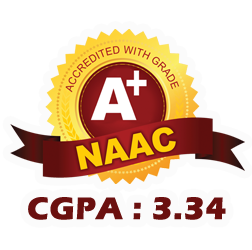Soft Skill Training

Effective communication and interpersonal skills are crucial to increase employment opportunities and to compete successfully in the business environment. The real key to the effectiveness of professionals is their ability to put their domain knowledge into effective practice. In this context, soft skills have a crucial role to play. If future managers know how to deal with people at the emotional level (peers, subordinates, superiors, clients, suppliers, etc.) through Emotional Intelligence (EI), they can build and sustain effective relationships that will result in mutual gain.
Soft skills provide students with a strong conceptual and practical framework to build, develop and manage teams. They play an important role in the development of the students’ overall personality, thereby enhancing their career prospects. The soft skills training provides strong practical orientation to the students and helps them in building and improving their skills in communication, the effective use of English, business correspondence, presentations, team building, leadership, time management, group discussions, interviews, and inter-personal skills. This training also helps students in career visioning and planning, effective resume writing and dealing with placement consultants and headhunters.
The training is conducted in a very informal, interesting, and interactive manner, which gives ample scope for the students to interact with each other and face a wide variety of issues, topics, and situations that they are likely to come across as entry-level managers.
- Develop effective communication skills (spoken and written).
- Develop effective presentation skills.
- Conduct effective business correspondence and prepare business reports which produce results.
- Become self-confident individuals by mastering inter-personal skills, team management skills, and leadership skills.
- Develop all-round personalities with a mature outlook to function effectively in different circumstances.
- Develop broad career plans, evaluate the employment market, identify the organizations to get good placement, match the job requirements and skill sets.
- Take part effectively in various selection procedures adopted by the recruiters.
In an age when relationships between individuals and organizations are getting more and more complex, it is not enough to only have an excellent IQ. Being good at number crunching and scoring high marks in subjects are not the only criteria for success in professional or personal life. The ability to deal with one’s feelings and understand the feelings of others in any given situation helps one to complement academic intelligence/cognitive capacities (IQ) with a humane understanding of issues. This ability is known as Emotional Intelligence or EI.
At the Soft Skills Coaching at MVMWGAC, coaching is imparted to fine-tune the students’ attitudes, values, beliefs, motivation, desires, feelings, eagerness to learn, willingness to share and embrace new ideas, goal orientation, flexibility, persuasion, futuristic thinking, compassion, diplomacy, and various skill sets of communication, manners, and etiquette so that they will be able to deal with different situations diligently and responsibly. Soft skills or Emotional Intelligence Skills strengthen them from within. These skills empower them to understand "who they are" and how best they can come across as competent individuals in any given situation.
The training in soft skills has two parts. One part involves developing attitudes and attributes, and the other part involves fine-tuning communication skills to express attitudes, ideas, and thoughts well. Crucial to successful work is the perfect integration of ideas and attitudes with appropriate communication skills in oral, written, and non-verbal areas. Attitudes and skills are integral to soft skills. Each one influences and complements the other.

